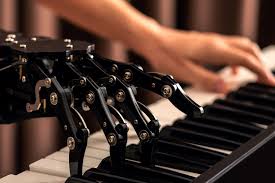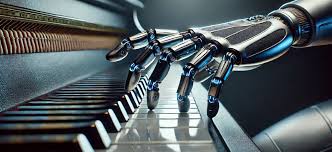Artificial Intelligence (AI) is no longer just a buzzword in tech — it’s quickly becoming a key player in the music industry. From creating entirely new sounds to curating personalized playlists, AI is transforming how music is made, distributed, and consumed. And unlike past innovations that mostly affected production or distribution, AI is now changing the creative side of music as well.
On the creation side, AI is making it easier for artists to experiment with ideas. Programs like AIVA, Amper Music, and OpenAI’s Jukebox can compose melodies, generate harmonies, and even create instrumental arrangements based on an artist’s preferred style. For independent musicians and producers with limited budgets, this is a game-changer. AI tools can provide a foundation to build upon — speeding up songwriting, helping with sound design, and even suggesting lyrics.

Personalization is another area where AI is thriving. Streaming platforms like Spotify, Apple Music, Boomplay, and Audiomack are using machine learning to analyze listening habits and deliver tailor-made playlists that match each listener’s mood, location, and time of day. This means every fan’s experience becomes unique, and artists get a better chance of finding their niche audience without relying solely on mainstream promotion.
AI is also playing a role in vocal synthesis and remix culture. Voice cloning and AI-generated vocals have already entered the music conversation — with some artists using them to experiment with new sounds and languages. Imagine a Nigerian singer using AI to create Yoruba, Igbo, and Hausa versions of the same song in minutes, making it more accessible to different audiences.
AI is also playing a role in vocal synthesis and remix culture. Voice cloning and AI-generated vocals have already entered the music conversation — with some artists using them to experiment with new sounds and languages. Imagine a Nigerian singer using AI to create Yoruba, Igbo, and Hausa versions of the same song in minutes, making it more accessible to different audiences.
Beyond music creation, AI is helping with marketing, too. Tools can now predict which songs are most likely to go viral based on streaming patterns and social media engagement. This allows artists to decide which tracks to push as singles, making their releases more strategic.
While some people worry that AI could replace human creativity, the current reality shows that it is more of a collaborator than a competitor. AI provides the tools, but human emotion, storytelling, and cultural nuance still drive music. The most successful artists are the ones learning to use AI as an extension of their creativity rather than a replacement.
For African and Nigerian music especially, this opens up exciting opportunities. Imagine Afrobeats infused with AI-generated percussion patterns, or AI-powered mastering making indie releases sound as polished as big-label productions. This levels the playing field, giving smaller artists the tools to compete globally.
Added by
LyricsSphere
WRITE A COMMENT
You must be logged in to post a comment.
WRITE A COMMENT
You must be logged in to post a comment.


No comments yet